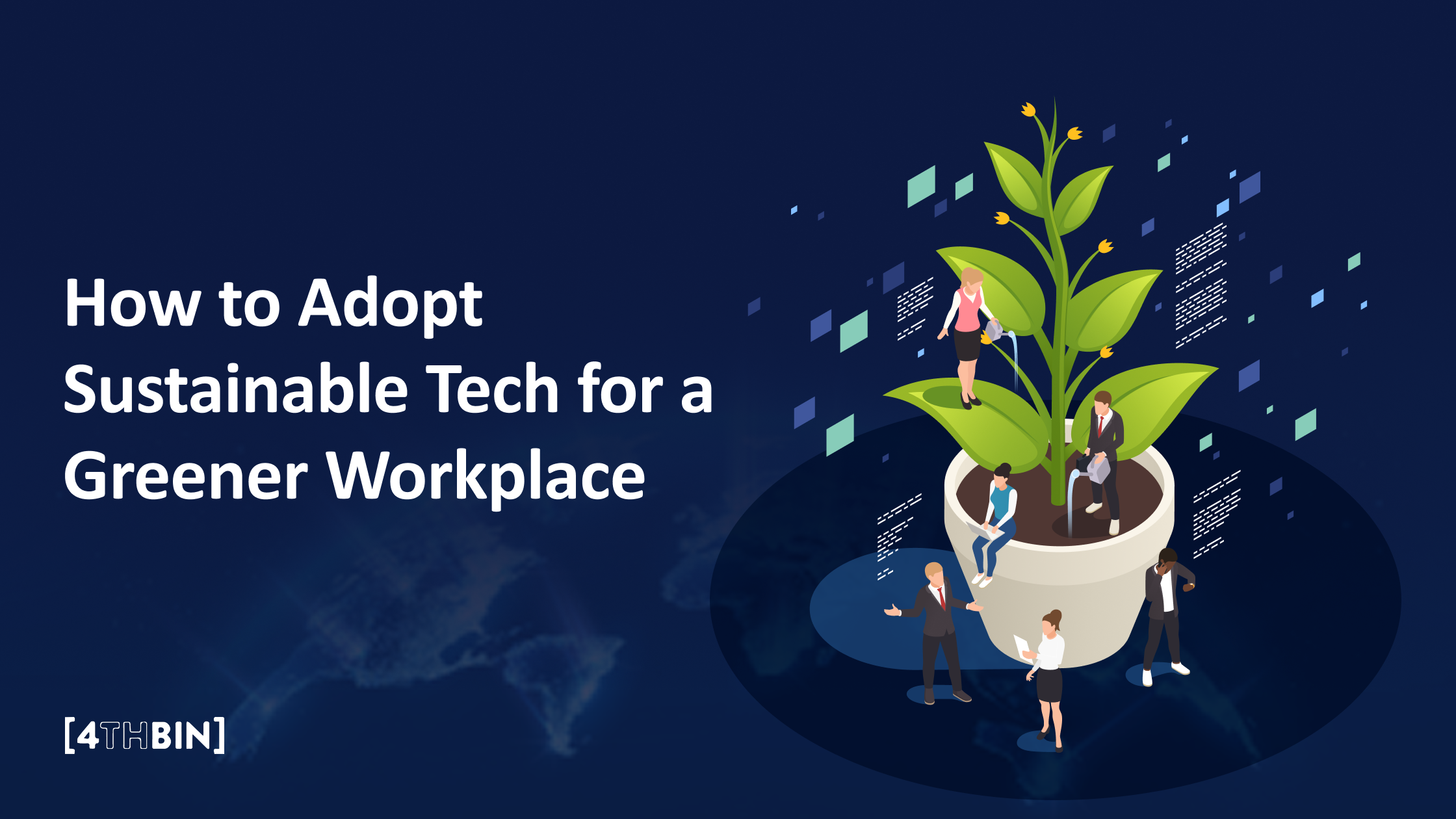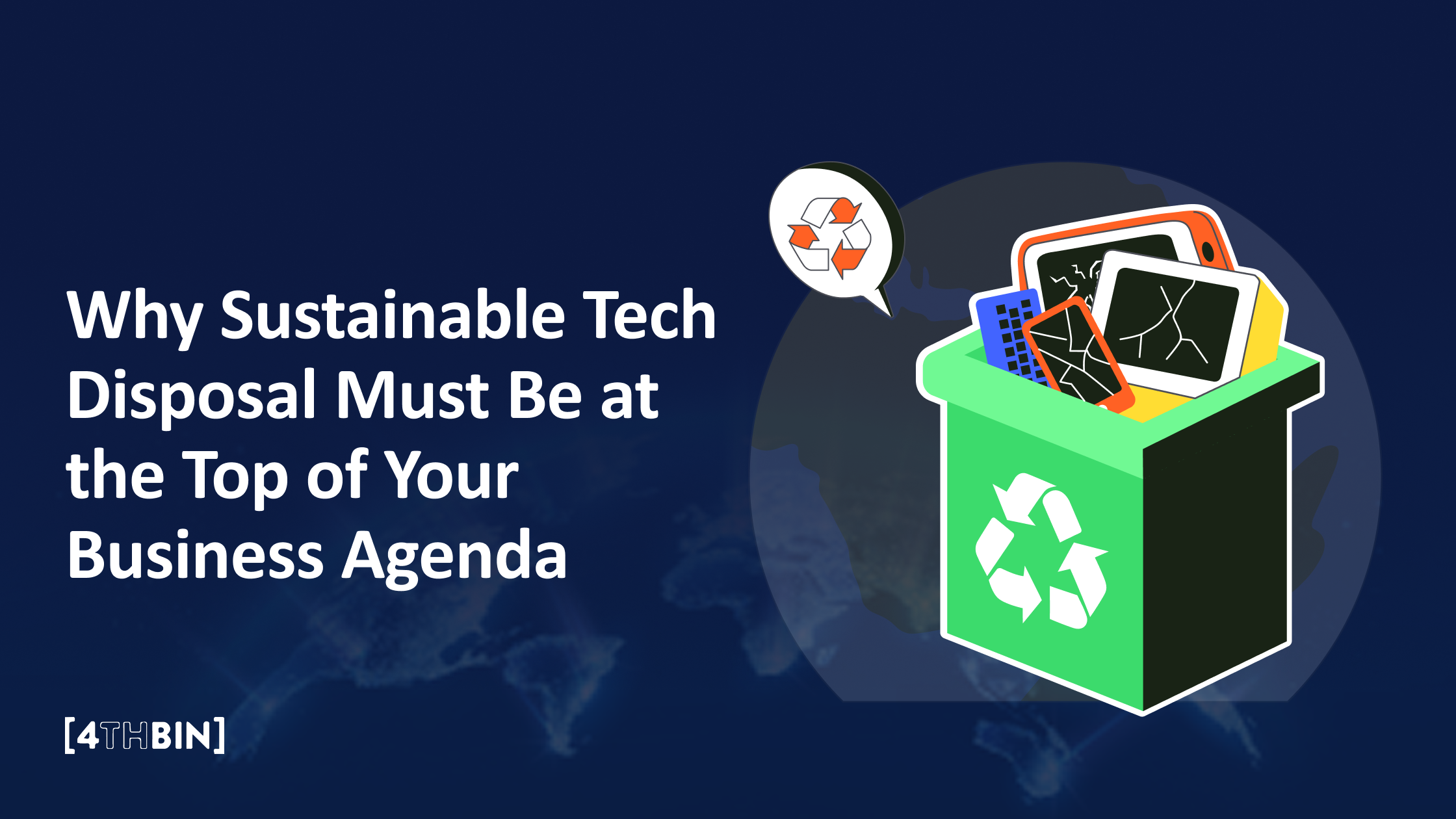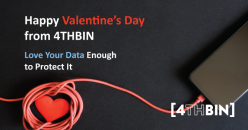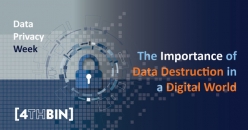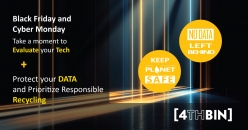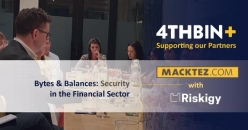The Ultimate Guide to R2v3 (Responsible Recycling) Certification
Each year, 62 million tons of electronic waste are generated, yet only 22.3% is properly collected and recycled. The remaining majority often ends up in landfills or is improperly processed, releasing hazardous materials like lead and mercury into the environment.
As businesses upgrade their technology, they often overlook the critical steps to manage electronic waste responsibly. In doing so, they expose themselves to serious risks such as regulatory penalties, security breaches from data left on discarded devices, environmental harm, and a loss of trust among clients and stakeholders.
With data security risks rising and sustainability becoming a core value for customers and investors, businesses must take e-waste management seriously.
This is why more organizations are turning to R2v3-certified recycling companies for their electronic waste management. The R2v3 certification sets the highest standards for responsible recycling. It ensures recyclers meet high standards of environmental protection, data security, and worker safety, giving companies peace of mind that their discarded electronics are handled responsibly.
In this blog, we’ll explore why working with an R2v3-certified recycler is critical for protecting your business, the environment, and your reputation.
What is R2v3 Certification?
The R2v3 (Responsible Recycling) Certification is an internationally recognized standard for responsible e-waste recycling and refurbishment. It ensures that e-waste is managed in a way that prioritizes environmental sustainability, data security, worker safety, and overall accountability. This certification represents the highest standard in the e-waste recycling industry, providing businesses and consumers with the confidence that their discarded electronics are handled ethically and securely.
The R2 Standard was developed in 2008 by Sustainable Electronics Recycling International (SERI) to address the growing concerns surrounding electronic waste. With e-waste becoming the fastest-growing waste stream globally, the purpose of the R2 Standard is to promote environmentally sound recycling and reuse of electronics, safeguard data security through proper destruction, mitigate environmental harm from hazardous e-waste, and ensure transparency and accountability in the recycling process.
Over the years, the R2 Standard has evolved to reflect industry advancements and address emerging challenges. The latest iteration, R2v3, represents a significant update, setting even higher benchmarks for responsible recycling practices.
Critical Features and Updates in R2v3 Certification
R2v3 builds upon the foundational principles of the original R2 Standard while introducing new requirements to address modern recycling challenges. Here are the features of R2v3:
Enhanced Data Security
A critical improvement is a stronger emphasis on data security. R2v3 introduces stricter protocols for sanitizing and destroying data stored on devices. Companies must have detailed processes for wiping or destroying any data left on devices. This protects businesses and individuals from data breaches and identity theft.
Downstream Accountability
Another primary focus of R2v3 is ensuring accountability throughout the recycling process. Certified companies must track where materials go after they leave their facilities. This is especially important for preventing hazardous materials, like mercury or lead, from ending up in landfills or being improperly handled overseas. They must also ensure that all downstream vendors in the recycling process meet R2v3 standards and maintain a transparent chain of custody to track materials from collection to final disposition.
Environmental Protection
The new version of the certification also stresses environmental protection. It mandates the safe handling of hazardous materials, such as lead and mercury, to prevent contamination. The accreditation also encourages companies to repair and refurbish old electronics instead of recycling old electronics. Certified facilities must prioritize repairing and reselling functioning devices before recycling them. This extends the life of devices, reducing the demand for new resources and reducing waste.
Improved Worker Safety
Worker safety is another critical part of R2v3. Recycling electronics can expose workers to harmful substances, so companies must follow strict safety protocols and provide regular training. The certification ensures companies implement stringent protocols and provide regular training and risk assessments to protect employees from exposure to harmful materials.
Facility-specific Certifications
Finally, the R2v3 certification requires each company's location to be certified individually. This means that no matter which facility you work with, you can trust it meets the same standards, ensuring consistency across multi-location organizations.
The Process of Earning R2v3 Certification
Becoming R2v3 certified involves a thorough and detailed process that ensures a company meets the highest standards for e-waste recycling. The steps include:
Self-Assessment
The company reviews its current practices to identify gaps and areas that need improvement to meet the R2v3 standards.
Developing Policies and Procedures
Detailed processes are created and documented, covering data destruction, hazardous material handling, environmental protection, and worker safety.
Third-Party Audit
An independent auditor visits the facility to verify compliance. This includes inspecting the site, reviewing documentation, and interviewing staff to ensure processes are followed correctly.
Certification
Once the company passes the audit, it receives the R2v3 certification for the specific facility.
Ongoing Audits
To maintain certification, companies must regularly undergo follow-up audits to ensure they continue to meet the standards and address any needed changes or improvements.
This structured process ensures that R2v3-certified companies like 4THBIN uphold the highest levels of accountability, security, and environmental responsibility.
Why Businesses Must Choose R2v3 Certified Recycling Companies
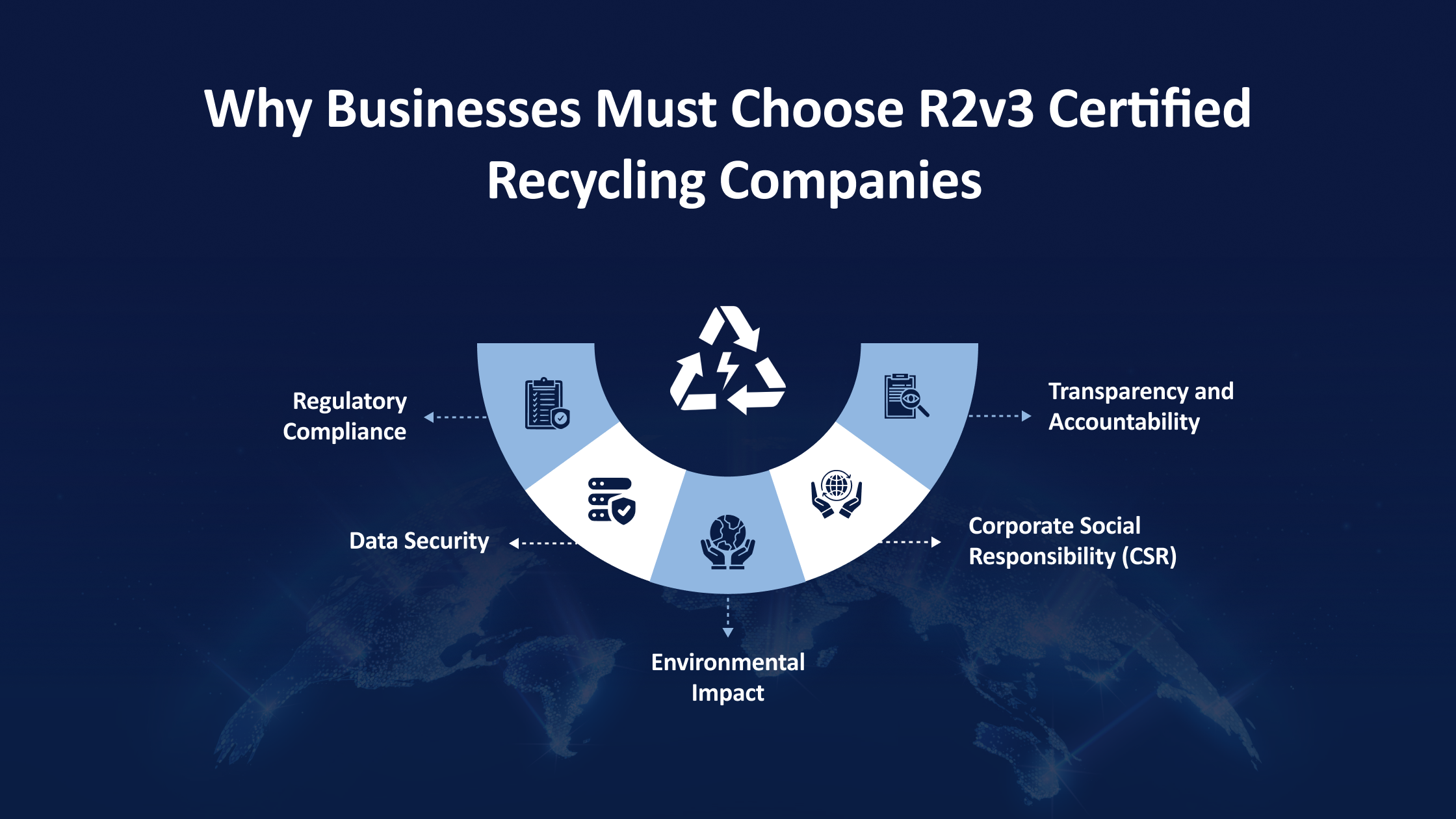
Businesses have a legal, ethical, and practical obligation to ensure their electronic waste is handled properly, and partnering with an R2v3-certified recycler addresses these responsibilities in several critical ways. Here are a few benefits of choosing R2v3-certified recycling companies:
Regulatory Compliance
E-waste management is governed by a complex network of local, national, and international regulations. Improper disposal can lead to heavy fines, legal complications, and damage to a company’s reputation. R2v3-certified recycling companies are well-versed in e-waste regulations and adhere to strict protocols to ensure compliance.
Working with an R2v3-certified partner allows businesses to be confident that environmental laws and standards are being followed when managing their e-waste. Whether handling hazardous materials like mercury or ensuring that their devices are disposed of ethically, an R2v3-certified recycler eliminates the guesswork and reduces risk.
Data Security
Data security is a top concern for businesses of all sizes today. Old devices often contain sensitive client records, financial data, and proprietary information that can pose serious risks if not properly destroyed.
R2v3-certified recyclers follow strict protocols for data destruction, including wiping or shredding hard drives and documenting the process. This ensures that your data cannot be recovered or misused. This level of security protects businesses against data breaches, identity theft, and potential legal liabilities. Choosing an R2v3-certified recycler is an investment in safeguarding your company’s information.
Environmental Impact
The environmental impact of e-waste is significant, with millions of tons of electronics discarded yearly. These devices often contain hazardous materials like lead, mercury, and cadmium, which can leak into the soil and water if improperly disposed of.
R2v3-certified recyclers take a proactive approach to minimizing environmental harm. They prioritize repairing and refurbishing electronics to extend their useful life and reduce waste.
When recycling is necessary, they ensure that materials are processed safely and responsibly, recovering valuable resources like silver, gold, and plastics for reuse. By partnering with an R2v3-certified company, businesses can play a critical role in reducing pollution, conserving natural resources, and supporting a more sustainable future.
Corporate Social Responsibility (CSR)
Consumers and clients are increasingly drawn to businesses committed to sustainability and ethical practices. Managing e-waste responsibly is essential to any Corporate Social Responsibility (CSR) strategy. Partnering with an R2v3-certified recycling company allows businesses to align with environmental goals and show stakeholders that they are taking action to reduce their ecological footprint.
An R2v3-certified recycler ensures that electronics are handled in ways that minimize environmental harm and support resource recovery through repair and refurbishment. By working with such a company, businesses contribute to reducing waste and pollution while enhancing their reputation as a socially responsible organization.
Transparency and Accountability
Transparency is the foundation of the R2v3 certification. Certified companies must maintain clear records of their processes and adhere to strict chain-of-custody requirements. This means businesses can track where their e-waste goes, from initial collection to final disposition, ensuring that every step meets high ethical and environmental standards.
For businesses, this level of accountability builds trust with stakeholders and ensures no room for mismanagement or unethical practices. It also provides documentation that can be used for internal reporting or to meet sustainability goals.
By choosing an R2v3-certified recycling company, businesses fulfill their legal and ethical responsibilities.
How to Partner with an R2v3 Certified Recycler
Choosing the right recycling partner is crucial in ensuring your business’s e-waste is handled responsibly, securely, and in compliance with environmental standards. Here’s how to identify and select the right R2v3-certified partner for your business needs:
How to Identify R2v3-Certified Companies
Finding an R2v3-certified recycler is straightforward if you know what to look for. You can begin by verifying their certification status on the Sustainable Electronics Recycling International (SERI) website, which provides an up-to-date list of certified facilities, including their scope of certification and compliance history.
The next step would be to look for a company that is transparent about its certification details, including the locations of certified facilities, as R2v3 certification is site-specific. Additionally, a trustworthy recycler will readily provide proof of their certification and clearly explain their processes to meet the standard’s rigorous requirements.
Checklist for Selecting the Right Recycling Partner
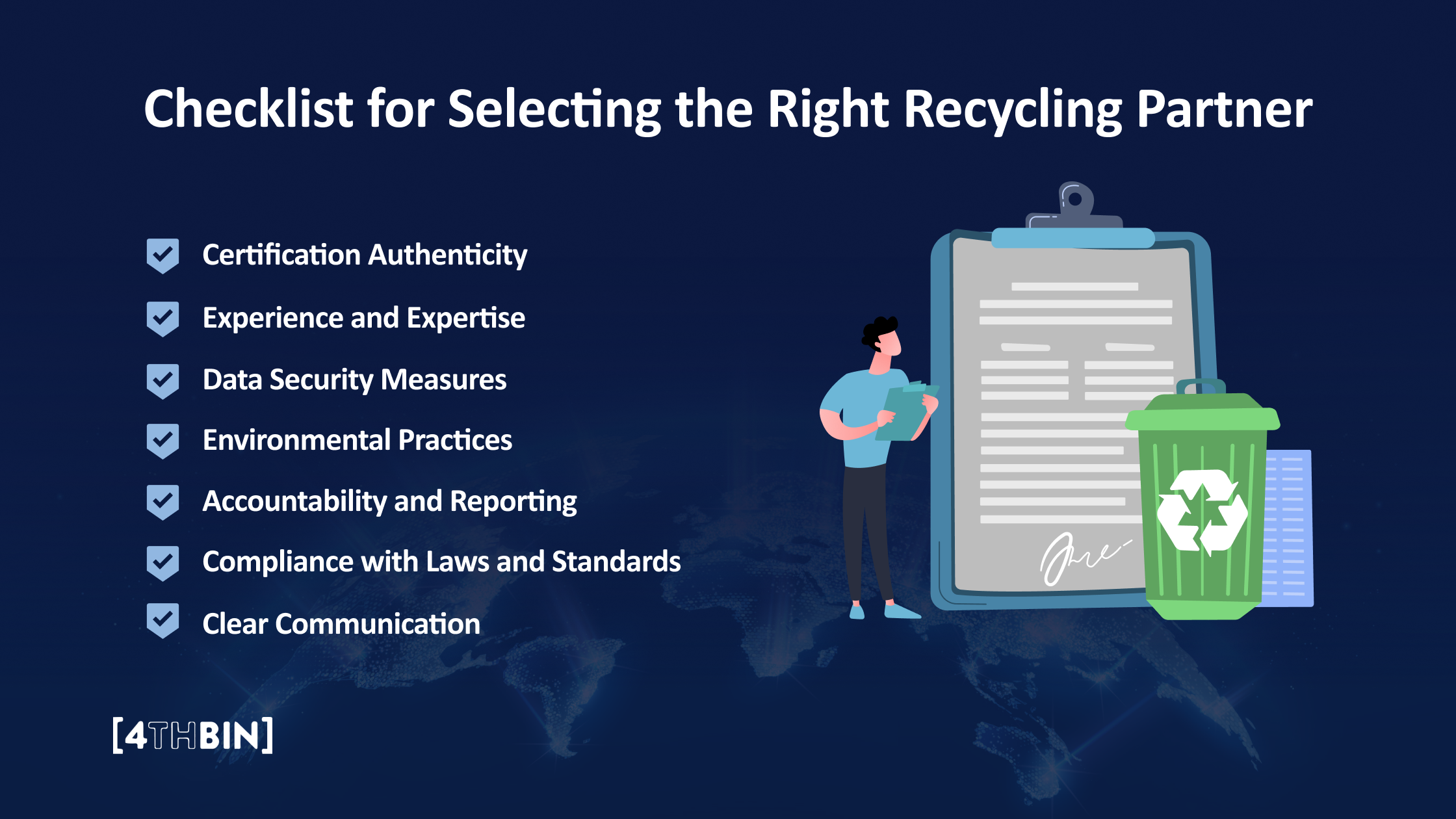
When evaluating potential R2v3-certified recyclers, use the following checklist to guide your decision:
- Certification Authenticity
Confirm that the recycler holds a valid and current R2v3 certification for the facility you plan to work with.
- Experience and Expertise
Choose a recycler with a proven track record in handling e-waste for businesses like yours. Experience in managing sensitive data and specific types of equipment is essential.
- Data Security Measures
Verify that the recycler has detailed processes for data destruction, including documented proof of data sanitization or destruction for every device.
- Environmental Practices
Assess their commitment to environmental protection. An ideal partner prioritizes reuse and refurbishment, reduces landfill waste, and ensures proper disposal of hazardous materials.
- Accountability and Reporting
Look for a recycler that provides detailed documentation and tracking for your e-waste, including certificates of destruction and recycling reports.
- Compliance with Laws and Standards
Ensure the recycler adheres to all relevant local, national, and international e-waste regulations and R2v3 standards.
- Clear Communication
A reliable recycler should be able to clearly explain their processes, answer your questions, and provide a seamless experience from pickup to final disposal.
By following these steps and using this checklist, businesses can confidently select an R2v3-certified recycler that aligns with their environmental goals and compliance needs. Partnering with a trusted provider like 4THBIN ensures your e-waste is handled responsibly, securely, and transparently, allowing you to focus on your business operations while contributing to a sustainable future.
Your Trusted Partner for R2v3 Certified Recycling: 4THBIN
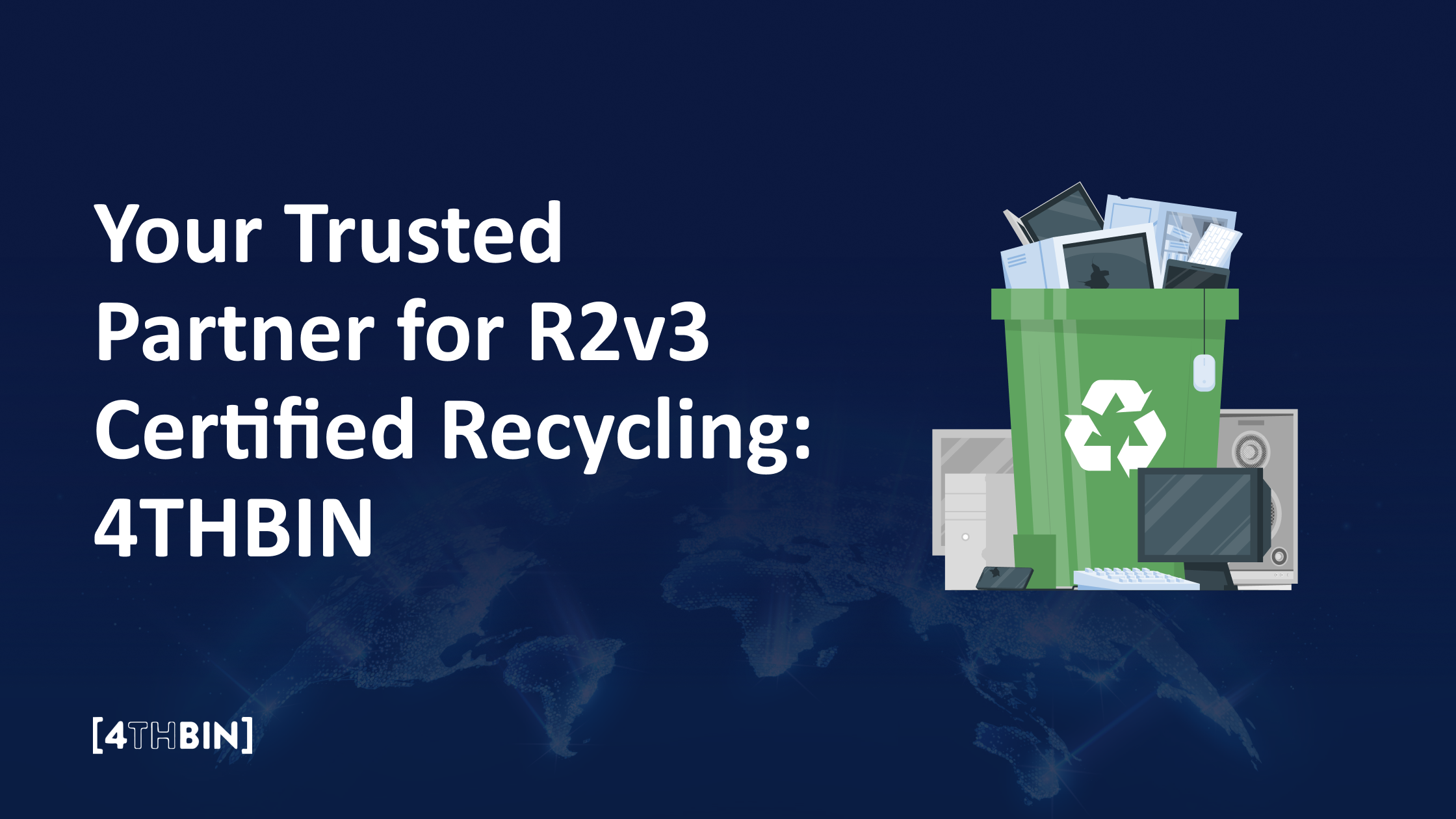
Choosing a certified recycler is no longer optional; it’s essential for ensuring compliance, safeguarding sensitive data, and minimizing environmental impact. With 4THBIN ’s R2v3-certified e-recycling solutions, your organization can rest assured of secure, compliant, and environmentally responsible electronic waste disposal.
With over a decade of experience, 4THBIN has partnered with more than 10,000 organizations, including Fortune 100 companies and small businesses, to transform e-waste challenges into opportunities. We make the process seamless, offering businesses a way to turn a potential liability into an opportunity for leadership in sustainability and responsibility.
Our certified data destruction services ensure that sensitive information is completely safeguarded, eliminating the risks of data recovery associated with improper disposal. From secure RemoteReturn mail-in options to convenient on-site collection, our customizable solutions allow you to choose the plan that best fits your organization’s needs.
Responsible E-Waste Recycling Starts Here.


